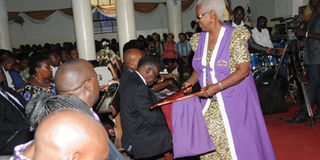To write your name or not on the Lord’s money bag

An usher passes the offertory bags at All Saints Cathedral Nakasero. While offertory can be done publicly and openly declared, debate rages on whether tithe, which is a matter between a believer and God, should be announced as well. Photo by Faiswal Kasirye.
What you need to know:
If the matter of the tithe is an issue between a Christian and God, why then do some churches ask followers to write names and contact details on envelopes?
As the Sunday morning service at one of the Pentecostal churches in Kampala comes to a close, the minister announces that it is time to give to the Lord. Ushers hand out envelopes, tithe envelopes. On the envelopes are provisions for one to write their name, the amount they are giving and contact details.
Stephen Mutaasa, a committed member of this church, seated next to me, puts a certain amount of money into the envelope, seals it, ready to join the other believers in the queue to the offertory basket. “You have not written anything on the envelope.” I tell him. “I used to, but no longer do,” he says. “I just put my tithe in the envelope and drop it in the basket,” Mutaasa explains.
Like Mutaasa, Peace Nabadda, a christian at Namirembe Christian Fellowship, believes that writing one’s particulars on the tithe envelope is not necessary. For Becky Asiimwe, however, writing on her tithe envelope is as obvious as paying the tithe itself. “Why not?” she wonders. “I pay my tithe regularly and write my name and the tithe number on my envelope,” Nabadda adds.
Tithing or the returning a tenth of one’s income to his or her local church, it seems, is a generally acceptable practice, a discipline in the Christian faith that many a Christian uphold. Indeed, rightly so as spelt out in Malachi 3:10, “Bring the whole tithe into the storehouse, that there may be food in my house.”
What is of contention, however, is whether or not the faithful should write their particulars on the tithe envelopes.
While it is obligatory for all Christians to tithe, some churches go on to ask followers to write their personal details on the tithe envelope - particulars like name, tithe amount and contact numbers. One of such churches is Makerere Full Gospel Church.
David Kamugisha, the church’s administrator, says it is for record purposes. “Every organisation keeps records and as a church, we need to keep our records,” he says. Kamugisha says such records are vital. “The church needs to know how many people are tithing, people who support the ministry,” he states.
According to Peace Nabadda, the question of whether or not she tithes is not for anyone to know. “I’m not proving to anyone that I pay my tithe. Tithing is between my God and I,” she remarks. Nabadda claims that the churches that ask Christians to write their particulars on tithe envelopes do so for ulterior motives. “They want to know who earns how much,” she claims, adding that that can be used against the person, when for instance, the church is fundraising and expects one to contribute a certain sum of money because they know how much they earn. “Sometimes you don’t have money but the church will expect you to contribute because they know how much you earn, and when you don’t, you may be looked at as someone who just refused to support the church.”
Yet, as Bishop Hannington Mutebi, the Assistant Bishop of Kampala Diocese notes, besides writing on the envelopes, some Christians voluntarily declare their earnings to their church leaders. “Christians today present their tithes to priests and ask them to pray blessings over such tithes,” he says. In which case, Mutebi argues, the drive for privacy ceases.
In the Anglican Church, according to the Rev Mutebi, the practice is not mandatory. “Some churches do, others don’t,” he says. The churches that ask their congregations to write particulars on the envelope, according to the Rev Mutebi, do so to make appropriate follow ups with their believers and for future interaction. “I think it’s not necessary but I have no problem with those who do write,” says the reverend.
Stephen Mutaasa explains that the misuse of personal details on the tithe envelope is what stops him from writing his name. “I found out that my church was using those details to treat people differently,” he claims. “Those who paid a big tithe received special treatment like being given special seats in the church while those who paid a small tithe; it was as though they were not Christians,” he asserts.
Mutaasa further says some churches give special responsibility to Christians basing on the believers’ level of tithing. Kamugisha notes though that it should not be about how much one pays in tithe but their level of commitment. “Alongside money, one must be involved in ministry activities,” he says. Although Kamugisha agrees that writing one’s particulars on the tithe envelope is not mandatory, he maintains that it’s good. “It shows that such Christians are faithful and committed to their church,” he says.
Asiimwe is not bothered by what happens to the information she provides. “Whatever they do with the information on my tithe envelope is not my business. It’s between them and God. Mine is to tithe,” she says. Asiimwe further argues that if there is such a thing as abusing the information Christians provide to their churches, then they ought to take heed. “God will charge everyone for their actions,” she cautions.
The Rev Father Dennis Kibalama, of, Rubaga Catholic Parish, says to write or not to write is a personal matter. “It should be one’s decision to take,” he says. “The Roman Catholic Church doesn’t focus much on it, and only a few Christians ask to record their tithe. For such Christians, we issue receipts,” he says.



